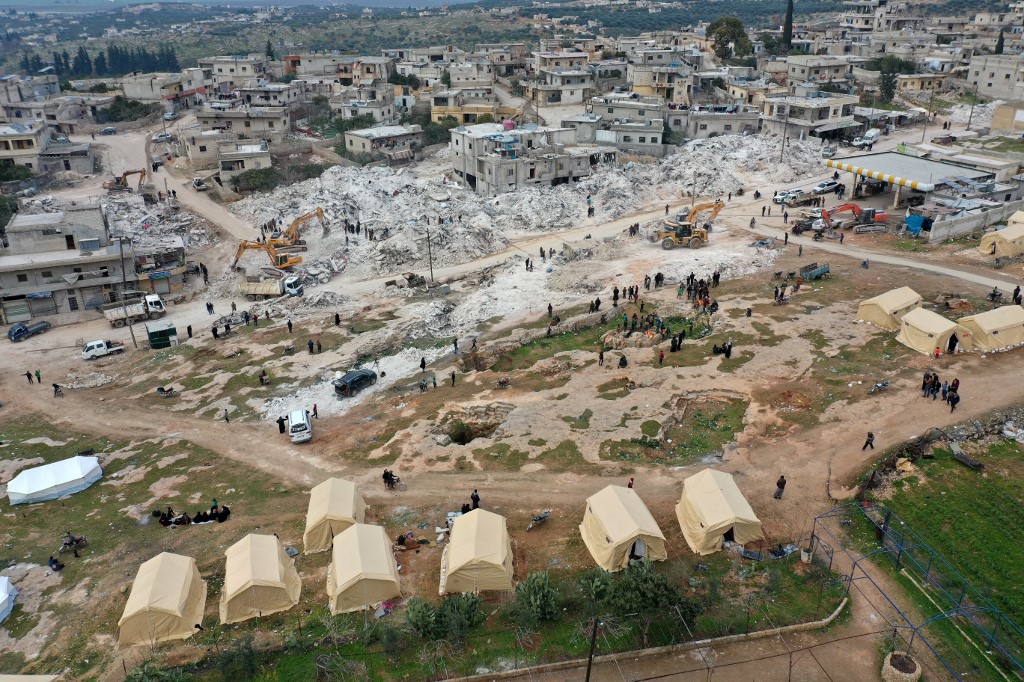The Turkish government, which has been receiving growing criticism due to what many say is its poor response to powerful earthquakes that hit the country’s south this month, has come under fire again for not providing shelter to survivors despite a huge amount of aid received from within Turkey and from overseas for earthquake victims.
Eleven provinces in the country’s south and southeast were hit by two powerful earthquakes, a magnitude 7.8 and 7.5, on Feb. 6, which were followed by numerous aftershocks, leading to the death of more than 41,000 people in Turkey and wreaking devastation in the region as well as in northwest Syria.
Hatay, which is among the 11 provinces hit hardest by the Feb. 6 earthquakes, was also shaken by a magnitude 6.4 earthquake on Monday that was followed by many aftershocks, including one measuring 5.8, which led to further destruction in the city and claimed six more lives.
Media reports and a district mayor said despite warnings from experts to stay away from damaged buildings, some Hatay residents had to stay in their ruined homes because there were not enough tents for them outside.
Although more than two weeks have passed since the Feb. 6 earthquakes, the Justice and Development Party’s (AKP) failure to provide shelter to all earthquake survivors despite the bitter cold has brought it harsh criticism, given the fact that there is an ongoing massive relief effort for Turkey.
Following Monday’s earthquakes, the mayor of Hatay’s Samandağ district, Refik Eryılmaz, told the media that many people who were not given a tent were forced to stay in their damaged homes due to the bitter cold.
“People should not be pushed to death this way. Our people want tents as soon as possible,” Eryılmaz told reporters on Monday evening following the earthquakes that hit Hatay.
Leader of the opposition Deva Party Ali Babacan asked President Recep Tayyip Erdoğan on Twitter why his government was waiting to send more tents to the earthquake zone.
“Since you could not provide shelter to people, they are obliged to stay in their damaged homes despite the risk of another earthquake. Our people are suffering. They need tents or shipping containers, Recep Tayyip Erdoğan,” said Babacan.
The government said last week that more than 5,400 shipping containers have been deployed as shelter and that some 200,000 tents were dispatched to the earthquake zone.
According to government figures, at least 84,000 buildings, containing more than 332,000 residential units, were either destroyed by the Feb. 6 quakes or are too damaged to be used. There is no official figure for the number of people displaced in Turkey’s disaster region, which is home to 14 million people, or 16 percent of the country’s population.
Celebrities also voiced disappointment and frustration on social media due to the inadequate number of tents for earthquake victims.
Director and comedian Şahan Gökbakar said it was a pity that although billions of Turkish lira had been collected for earthquake victims, with state agencies and municipalities talking about establishing tent cities in the earthquake region, people are still begging for shelter.
Gökhan Özoğuz, a famous Turkish singer, told Turkish officials that if they don’t immediately use the TL 115,146,528, 000 ($6 billion) raised at a fundraiser on Turkish TV for the earthquake victims to provide them with tents, there may be more loss of life.
The fundraising campaign, which was broadcast live on many TV stations in Turkey, sparked some controversy due to the donations made by the country’s central bank and state-run banks on the grounds that they were taxpayer-funded government institutions.
The money raised in the fundraiser will be used by the Disaster and Emergency Management Authority (AFAD) and the Turkish Red Crescent (Kızılay).
AFAD has drawn widespread criticism and anger from the earthquake victims due to its slow and ineffective response in the aftermath of the tragedy, leaving dozens of flattened buildings unattended due to the lack of sufficient number of search and rescue teams and inefficient coordination.
Kızılay, the largest humanitarian aid organization in Turkey founded during the time of the Ottoman Empire in 1868, is accused of having turned into an AKP backyard with the appointment of pro-government bureaucrats, hence losing its capabilities to quickly intervene in disasters.
International aid has poured into Turkey and parts of Syria following the Feb. 6 earthquakes. Last week, the United Nations launched an appeal for $1 billion to help Turkey’s victims of the catastrophic earthquakes, while Washington has contributed $185 million in assistance to Turkey and Syria.
In addition to other relief organizations in Turkey and abroad that have collected aid for the victims of Turkey’s earthquakes, the Foundation of Anatolian People and Peace Platform (AHBAP), which has Turkish rock singer Haluk Levent on its board of directors, has so far collected more than TL 1 billion ($53 million) in donations for the earthquake victims.

